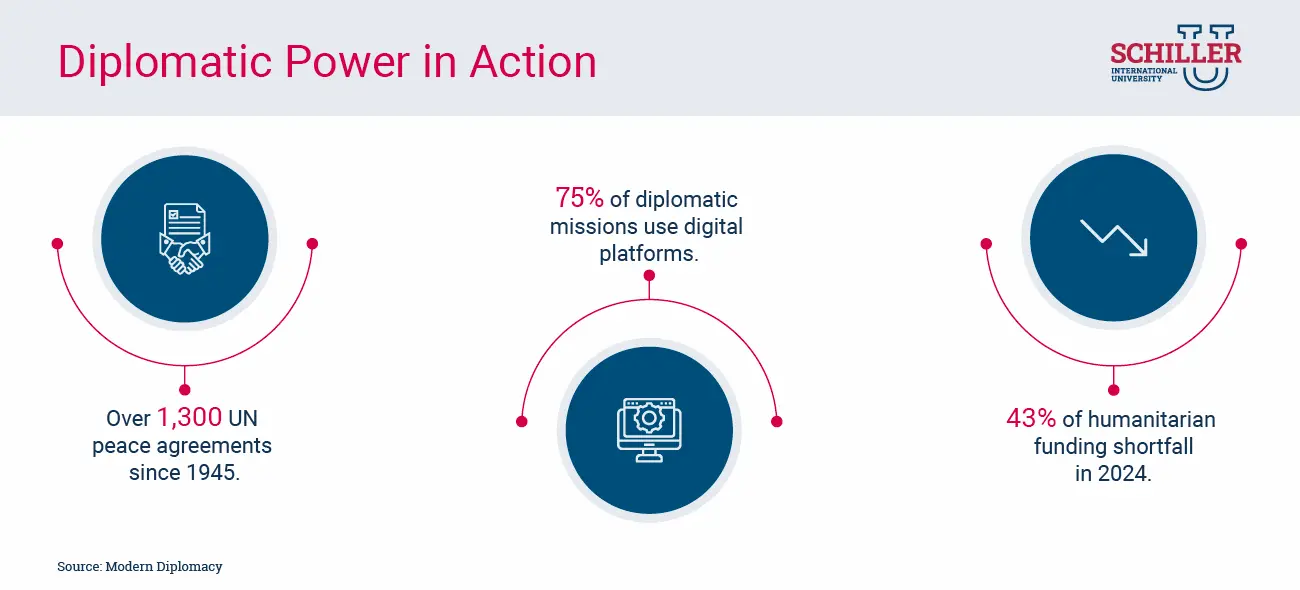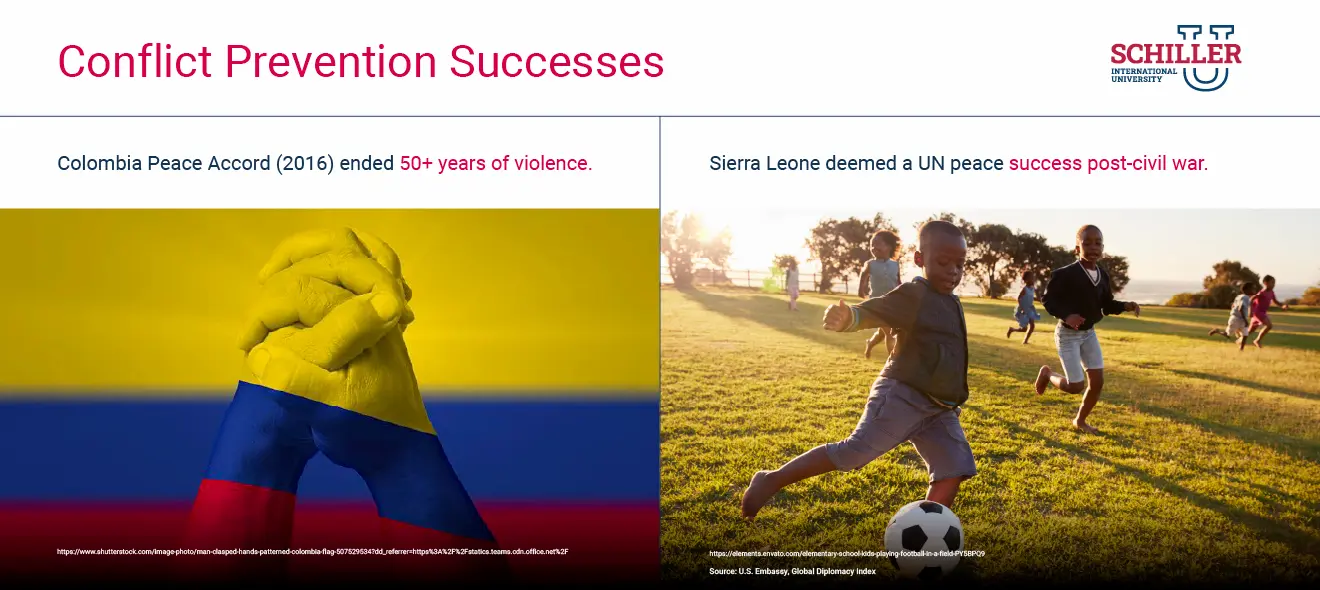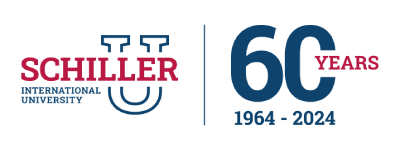The importance of diplomacy isn’t some lofty concept you only find in textbooks or historic backroom meetings. It’s the real engine behind how countries avoid chaos, turn bitter rivalries into peace, and shape the world you’ll call home. Diplomacy is the art of finding common ground across cultures, untangling disputes, and stopping violence before it starts. While wars grab headlines, diplomatic work hums beneath the surface, building trust, speaking tough truths, or quietly defusing bombs that never make headlines.
Over centuries, it's shaped how countries deal with each other, from ancient treaties to today's video calls between leaders. Its real magic isn’t just in stopping wars, but in preventing them, keeping borders fluid for ideas and trade, and guiding nations through the messiest moments with a focus on dialogue, empathy, and accountability. Learn how diplomacy in conflict resolution sits at the heart of a peaceful, prosperous future, driving career paths and skill sets that matter more now than ever.
Importance of Diplomacy: The Foundation of International Relations
Diplomacy isn’t just showy summits or polished speeches in fancy cities. It’s a living, breathing tool. Countries choose negotiation over conflict, seeking fixes that benefit everyone, not just the powerful. The international system relies on it to keep things steady. Global conflict resolution often starts with quiet chats that stop fights before they start. Peacebuilding and diplomacy go hand in hand, creating paths to calm.
The role of diplomacy in international relations is the key to handling tricky ties between countries. Diplomatic solutions to global conflicts offer ways out without force. Conflict prevention through diplomacy spots troubles early. Digital diplomacy adds new layers with online tools. The United Nations leads many efforts here. Diplomatic communication bridges the gaps in understanding. Global governance needs it to function well. Conflict resolution thrives on patient talks.
How Modern Diplomacy Works
| Aspect | Example and Impact |
| Digital Presence | 75% of diplomatic missions online |
| UN Peace Agreements | Over 1,300 since 1945 |
| Face-To-Face Value | Still critical, even as tech expands |
(Source: Modern Diplomacy and Global Diplomacy Index)
Understanding the Importance of Diplomacy in Today’s World
Diplomacy has come a long way from horse-drawn messengers to instant Zoom huddles. Back then, it was about face-to-face deals in grand halls. Now, digital diplomacy lets leaders tweet their way to accords.
This shift helps in a world where news spreads like wildfire. The international system gets more tangled with trade wars and cyber threats. Skilled diplomatic communication cuts through the noise.
Organizations like the United Nations step in to guide talks on big issues. They push for rules that everyone follows, making global governance smoother. Without this, small beef disagreements can rapidly escalate. Think about how technology speeds up responses but also stirs up misinformation. Diplomats adapt, using apps to rally support. It's all about staying ahead in a connected world.
How Diplomacy Resolves Global Conflicts

Spotting trouble early lets diplomats jump in with talks. Conflict prevention through diplomacy uses alerts to cool off hot spots. Once things heat up, mediation brings sides together for deals. Look at the Cuban Missile Crisis: backchannel chats averted nuclear mess (Report by Council on Foreign Relations).
Or the Oslo Accords, where secret meetings eased Israeli-Palestinian strains (Modern Diplomacy). These wins show that diplomatic solutions to global conflicts work when the force fails.
The Global Peace Index 2025 reveals peace has been dropping for years, with conflicts up 25% in 2024, as per the report by ACLED. Preventing conflicts saves billions and lives. Diplomats negotiate ceasefires, set up safe zones. It's not perfect, but it beats endless fighting.
How Diplomacy in Conflict Resolution Shapes Global Safety
Conflict Prevention: Diplomacy works before bullets fly—early warning, negotiation, and mediation all start before anyone sees a headline.
Negotiation: Diplomats are trained to mediate, finding common ground between even the tensest foes.
Case Studies:
- Colombia Peace Accord (2016): Ended decades of violence through sustained talks.
- Sierra Leone: Diplomatic engagement turned a brutal war into a success story.
- Good Friday Agreement (1998): The US-brokered deal brought Northern Ireland out of strife.
(Source: U.S. Embassy)
Building Trust and Cooperation Through Diplomatic Communication
Trust doesn't appear overnight; it grows from honest conversations. Building trust lets countries share their real concerns. Cultural nods and empathy make diplomatic communication click. One-on-one deals handle private matters, while group efforts tackle big problems.
Fostering cooperation turns solo players into teams. Take bilateral trade deals—they ease borders and boost economies. Multilateral setups, like climate summits, pool ideas for shared wins.
Without trust, talks stall. Empathy helps you see the other side's view. It's like mending a friendship after a spat. Diplomats listen more than they speak, finding wins for all. This approach keeps the international system humming.
Trust sits at the core of any real solution. Without it, peace deals fragment or fall apart.
- Cultural Sensitivity: Empathy and respect for traditions or belief systems break down walls.
- Bilateral vs. Multilateral: Two sides talking (bilateral) bring speed; many parties (multilateral) build broader legitimacy and cooperation.
The Role of Modern Tools and Digital Diplomacy
Technology flips diplomacy on its head with quick shares. Digital diplomacy uses platforms to sway crowds and spread information. Social media rallies support causes, reaching billions fast. But watch out – fake news can derail efforts.
Opportunities pop up in virtual meetings, cutting travel. Risks include hacks that steal secrets. In 2024, 39% of comms faced cyber hits. Tools like virtual reality (VR) build empathy in training. It's a double-edged sword: speed helps, but errors spread widely. Diplomats learn to navigate this for a better role in preventing issues.
Why Digital Diplomacy Matters More Than Ever
Technology doesn’t just speed things up—it shuffles the rules. A tweet can now ignite, or defuse, a crisis.
- Social Media Reach: In 2022, diplomacy campaigns on social media reached 1.2 billion people.
- Cybersecurity: Nearly 39% of diplomatic communications face cyber threats.
- Global System: Digital tools let governments coordinate surprise aid—or deal with sudden disasters instantly.
Challenges Facing Diplomacy in the 21st Century

Nationalism surges, making deals harder as countries pull back. Global governance suffers when power tilts one way. Long fights, like in Gaza, test patience (A report by Statista).
Diplomats contend with uneven playing fields where big players dominate. Sustaining calm needs constant work. Rising walls impede cooperation. Power shifts stir doubts in the international system.
Prolonged clashes drain resources, per UN reports of 305 million in need (By YouTube UN). Yet, persistent diplomatic efforts chip away at barriers.
Modern Challenges in Peacebuilding and Diplomacy
Rising Nationalism: Country-first attitudes chip away at global unity.
Geopolitical Fractures: Russia’s war in Ukraine and US-China rivalries make compromise harder.
Resource Gaps: Humanitarian funding shortfalls leave millions at risk (43% of needed funding met in 2024).
Digital Misinformation: Lies travel faster than corrections, making trust harder to build.
Preparing the Next Generation of Diplomats
Step into modern diplomacy with real, ready-for-anything training. At Schiller International University, the Bachelor of Arts in International Relations and Diplomacy blends conflict negotiation, intercultural intelligence, and strategic thinking with case studies from global hotspots.
Skills Gained at Schiller
- Negotiation
- Conflict Resolution
- Cultural Intelligence
- Global Network Creation
Why Embrace Diplomacy for a Better Tomorrow
The importance of diplomacy stands out in stopping and fixing world problems. It offers lasting fixes where bullets don't. Students grab these skills – they open doors to change.
If you want to have a real impact, learn the art of diplomatic communication, negotiation, and cultural agility. Programs like Schiller’s BA in International Relations and Diplomacy deliver hands-on training so you’re ready for the messy, meaningful work of conflict prevention through diplomacy. Apply now!
FAQs
Q1: What is diplomacy and why is it important in resolving global conflicts?
Answer: Diplomacy means nations talking to sort issues peacefully. It matters because it stops violence, saves resources, and creates stable ties for trade and security.
Q2: How does diplomacy prevent conflicts from escalating?
Answer: By spotting early signs and starting dialogues, it cools tempers and finds compromises before things boil over into fights.
Q3: What skills do diplomats need to be effective at conflict resolution?
Answer: They require sharp listening, cultural awareness, patience, and strategy to navigate talks and seal agreements.
Q4: How can international organizations support diplomatic efforts?
Answer: Groups like the UN offer neutral space, resources, and experts to mediate and enforce deals among countries.
Q5: What challenges do diplomats face when resolving global conflicts?
Answer: They deal with mistrust, political pressures, and cultural clashes that slow progress and demand creative fixes.

 Request information
Request information









